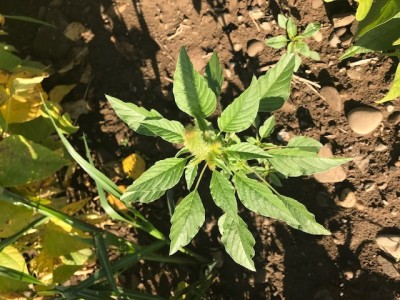Palmer Amaranth Confirmed in Southwest New York
Joshua Putman, Field Crops and Forage Specialist
Southwest New York Dairy, Livestock and Field Crops Program

Palmer amaranth (Amaranthus palmeri) is a serious problem for many growers throughout the United States because of its competitiveness and effect on agricultural production. Palmer amaranth is commonly confused with other pigweeds and is often difficult to identify in the early stages of growth. Much of the Palmer amaranth in the United States is resistant to several classes of herbicides such as glyphosate, and it's common for many of these to be resistant to ALS-inhibiting herbicides such as Pursuit and Classic.
Earlier this fall, it was noticed in two dry bean and several soybean production fields in Steuben County. This is the second population of Palmer amaranth to be found in New York, but is the first population to be found in a crop production setting. The fields are located along a high traffic roadway where it's possible that the specimens came in on a tractor trailer or piece of machinery. It is important to know the biology of Palmer amaranth to avoid its potential to spread to surrounding counties.
Palmer amaranth is aggressive as it competes for nutrients, sunlight, and water. Palmer amaranth has dioecious reproduction, so individual plants are either male or female, which forces outcrossing and genetic diversity. Under ideal conditions, Palmer amaranth can grow 2-3 inches per day and within a few months of emergence, can reach heights of 6-8 feet. It is a highly prolific seed producer in that it can produce 100,000-600,000 seeds per female plant. The seed is also very small and can be transported via machinery, mud, or travel on the bottom of your shoe. As the plant matures, it forms a poinsettia appearance and is a key characteristic for identification. It has been found that the presence of this weed species can double or triple your cost of management on the farm. If you suspect you have this weed species, please contact your local specialist or CCE office for correct identification and management. You may also see the link below for more information.
Upcoming Events
Crops, Cows & Critters - Southwest New York Dairy, Livestock & Field Crops Newsletter Sponsorship
December 19, 2025
Our two forms of publications feature research-based and timely information from our four specialists, listed to the right, along with local event notifications and Cornell University outreach. This information is provided to participants who range from dairy, livestock, and field crops producers to agricultural suppliers and consultants.
Weekly Email Update: Shared with 625+ households who have signed up with our program.
Monthly Paper Mailer: To reach our stakeholders and farmers who lack internet access, we send out a monthly mailer where your company's logo and contact information would be featured with a mailing list of 330+ households.
If you sponsor our weekly and monthly publications you reach approximately 955 households.
Visit our website to view our newsletters!
2025 Cornell Food Beverage & Animal Feed Manufacturer Survey
December 19, 2025
Industry and Educational Advocates for New York State's Food, Beverage, and Animal Feed Manufacturing industries:
As you know, NYS has a diverse food and beverage manufacturing industry, in both the types of industries that exist and the wide distribution of firms by scale. Many manufacturing firms have strong backward linkages to agricultural production sectors in the state that support both farm-level and downstream food industry firms and consumers. In collaboration with the New York State Department of Agriculture and Markets, a team from Cornell University's Charles H. Dyson School of Applied Economics and Management has recently rolled out the 2025 New York State Food, Beverage, and Animal Feed Manufacturer Survey. The industry will benefit from an updated assessment of the industry that informs private and public investments and opportunities to support firm growth and improved profitability.
Cornell Organic Field Crops & Dairy Conference
March 6, 2026
Waterloo, NY
Farmers, researchers, educators, and agricultural service providers from across the Northeast are invited to the 2026 Cornell Organic Field Crops & Dairy Conference, held Friday, March 6, 2026, from 8:00 a.m. to 4:30 p.m. at the Lux Hotel & Conference Center in Waterloo, N.Y.
Co-hosted by New York Soil Health and Cornell CALS, the annual conference brings together leaders in organic grain, dairy, and livestock systems to share practical tools, new research, and farmer-tested strategies to support resilient and profitable organic production.
Announcements
No announcements at this time.





